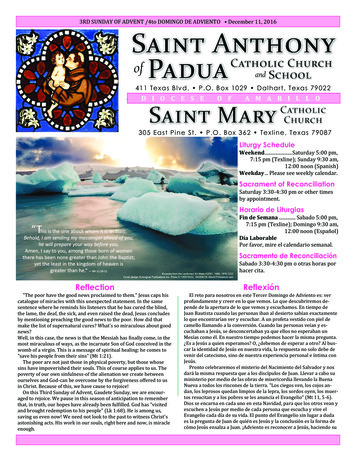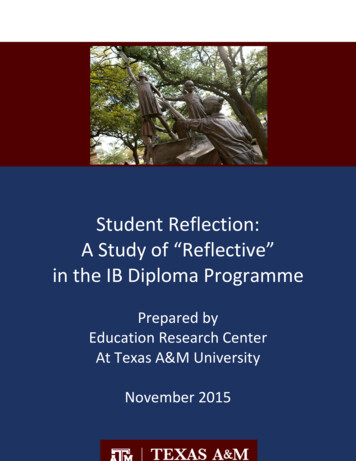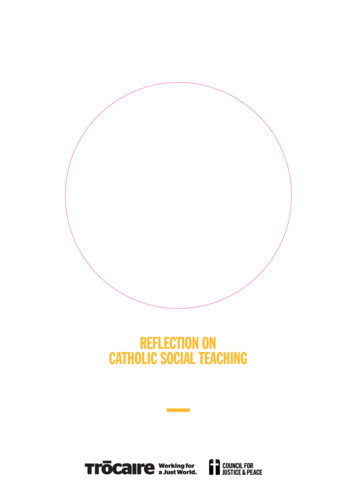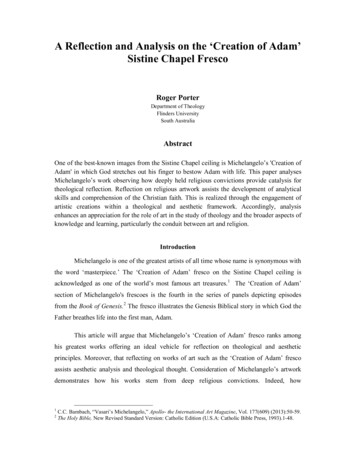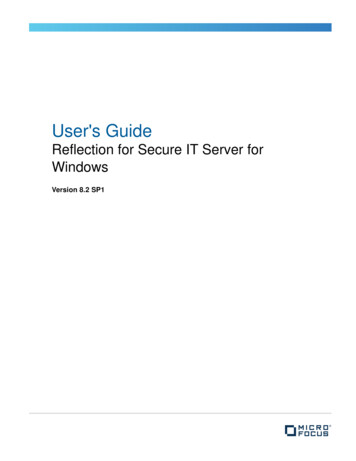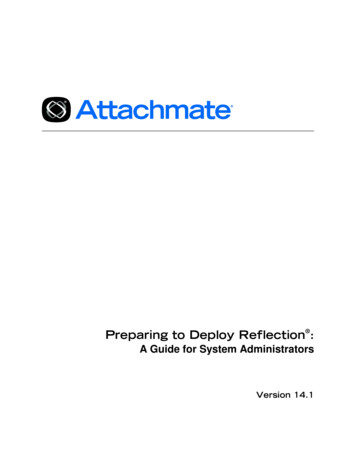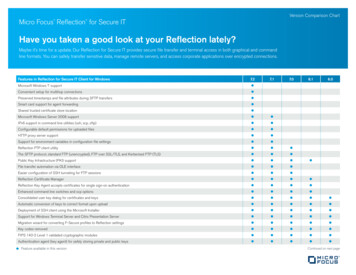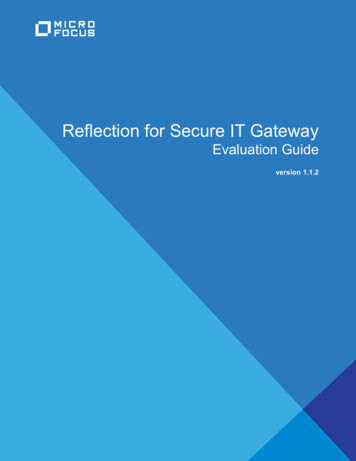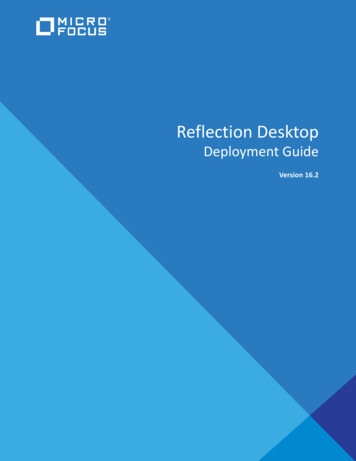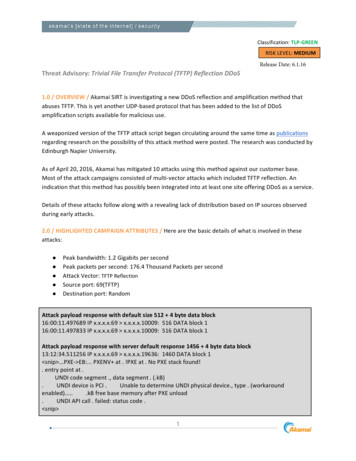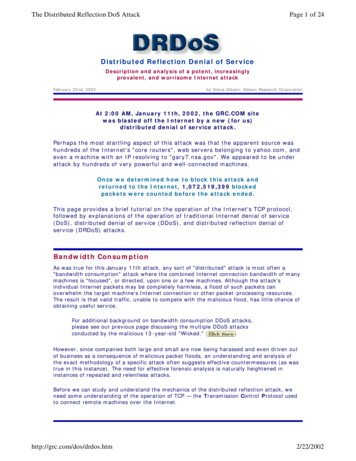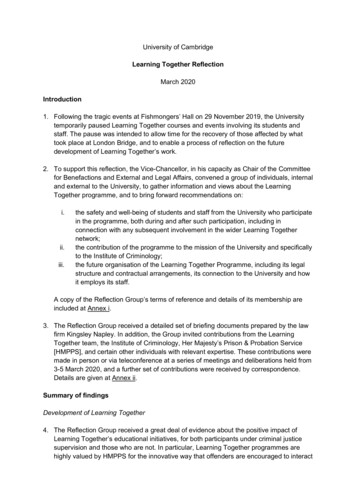
Transcription
University of CambridgeLearning Together ReflectionMarch 2020Introduction1. Following the tragic events at Fishmongers’ Hall on 29 November 2019, the Universitytemporarily paused Learning Together courses and events involving its students andstaff. The pause was intended to allow time for the recovery of those affected by whattook place at London Bridge, and to enable a process of reflection on the futuredevelopment of Learning Together’s work.2. To support this reflection, the Vice-Chancellor, in his capacity as Chair of the Committeefor Benefactions and External and Legal Affairs, convened a group of individuals, internaland external to the University, to gather information and views about the LearningTogether programme, and to bring forward recommendations on:i.ii.iii.the safety and well-being of students and staff from the University who participatein the programme, both during and after such participation, including inconnection with any subsequent involvement in the wider Learning Togethernetwork;the contribution of the programme to the mission of the University and specificallyto the Institute of Criminology;the future organisation of the Learning Together Programme, including its legalstructure and contractual arrangements, its connection to the University and howit employs its staff.A copy of the Reflection Group’s terms of reference and details of its membership areincluded at Annex i.3. The Reflection Group received a detailed set of briefing documents prepared by the lawfirm Kingsley Napley. In addition, the Group invited contributions from the LearningTogether team, the Institute of Criminology, Her Majesty’s Prison & Probation Service[HMPPS], and certain other individuals with relevant expertise. These contributions weremade in person or via teleconference at a series of meetings and deliberations held from3-5 March 2020, and a further set of contributions were received by correspondence.Details are given at Annex ii.Summary of findingsDevelopment of Learning Together4. The Reflection Group received a great deal of evidence about the positive impact ofLearning Together’s educational initiatives, for both participants under criminal justicesupervision and those who are not. In particular, Learning Together programmes arehighly valued by HMPPS for the innovative way that offenders are encouraged to interact
as peers with positive, socially engaged (‘prosocial’) role models, thereby helping toencourage desistance from crime.5. In the five years since the first partnership was established between the University ofCambridge and HMP Grendon, Learning Together has experienced considerable growthin the volume and reach of its activities, bringing in multiple partners in the UK and,increasingly, overseas. Until recently, a significant amount of this work was performed bythe Directors on a voluntary basis.6. The scale and rapidity of this expansion had led the Learning Together Directors to begina strategic review, supported by funding from HMPPS. The Reflection Group wasinformed that plans were being developed to establish a formal network as acoordinating organisation for the various local partnerships delivering Learning Togethercourses, e.g. to develop consistent policies, to support the sharing of best practice, andto organise community events for Learning Together alumni. This work was in nascentform when the current pause and reflection process were initiated; hence, questionsabout the funding and legal structure of the network, and its ongoing relationship to theUniversity of Cambridge, remain to be resolved.Safety and well-being7. The reflection process was not focused on the events of 29 November. However, severalcontributors stressed their view that such an attack could not reasonably have beenforeseen. Given this shift in the risk terrain, the Reflection Group sought to gatherinformation about protocols in certain areas of concern now understood to have thepotential for risk, and to make recommendations for strengthening these.8. The Reflection Group was informed that the last audit by the University’s Safety Office ofrisk management processes in the Institute of Criminology appears to have been in 2007(i.e. prior to the establishment of Learning Together).9. It was demonstrated that the Institute has well-developed, and nationally audited,protocols for managing risks which may arise through research in prisons and withoffenders. Learning Together courses, which principally take the form of teachinginterventions in a prison setting, do not align straightforwardly with these researchprotocols. Some uncertainty was also expressed about governance arrangements incases where staff and students from outside the Institute of Criminology contribute toLearning Together activities.10. A draft toolkit of policies, principles, and practices (in development for the wider LearningTogether Network under the HMPPS grant) was reviewed, and there is an opportunity forthese to be further strengthened. For example, the Reflection Group proposes that thereshould be:i.ii.more explicit arrangements on co-operation and co-ordination between theUniversity and HMPPS, and how the Learning Together programme benefits fromthe expertise of the latter on risk management;introduction of regular audit and continuous, dynamic improvement of the toolkit;
iii.iv.v.implementation of a procedure for anonymous reporting of concerns, nearmisses, or incidents, including an appropriate arms-length process for respondingto these;a detailed needs evaluation for welfare support, and explicit systems to ensurethe overall well-being of students and staff involved in the programme;stronger governance for oversight of risk, safety, and well-being.11. Importantly, the Reflection Group believes that careful consideration should be given torisk assessment for Learning Together community (sometimes referred to as ‘alumni’)events, which take place outside the prison estate and may include prisoners ontemporary release or under licence. Specific protocols need to be developed to addressthis area of concern.Contribution to mission12. The Reflection Group heard that Learning Together has evolved considerably over itsfive years. It is clear that, at the outset, there was a strong criminological element to theprogramme’s activities, e.g. taking students from the Institute into prisons to learncriminology together with offenders. This was reported to be of considerable benefit tothe Institute and its students.13. Learning Together may now have a less direct relationship with the Institute. Examplesto support this view include the fact that, in recent years, both participating students andthe courses offered have been drawn from across the collegiate University; and thedevelopment, noted above, of a wider Learning Together Network spanning multiplepartnerships in the UK and abroad, with the possibility that this could be managedthrough a spinout Community Interest Company. The Reflection Group received anumber of different opinions on whether Learning Together had, in fact, outgrown itsoriginal home in the Institute.14. In parallel, Learning Together’s contribution to the research mission of the Institute wasnot consistently understood. The Reflection Group concluded that, in order to enhanceLearning Together’s research platform, it will be important to build collaborations withresearchers who have a degree of personal and philosophical distance from theprogrammes, perhaps including quantitative researchers who can help to evidencelongitudinal outcomes.Future organisation15. The Reflection Group invited opinions on where, in the future, the important work ofLearning Together would best be hosted within the University, including the question asto what role the University may want to have in the emergent Learning TogetherNetwork. There was no consensus on these issues amongst the contributors.16. The Reflection Group suggests that Learning Together’s local activities (i.e. the coursesdelivered in partnership with HMP Grendon, HMP Whitemoor, and HMP Warren Hill) andthe development work for the network are a difficult fit for the risk assessment andoversight procedures in one of the University’s academic departments.
Recommendations17. The Reflection Group makes the following two recommendations and suggests thatthese be put into effect as soon as practicable.18. First, a process is needed in order to enable the pause on activities to be lifted whilstassuring the University that its students and staff are safe. Thus, the Reflection Grouprecommends convening an advisory body comprising an independent auditor and anacademic, ideally external to the University, with appropriate expertise of work in prisonsor with offenders in the community. Before activities recommence, this body would beasked to:i.ii.advise on the further development of Learning Together’s safeguarding and riskassessment processes as suggested above, and sign these off;undertake an audit of all of the Institute’s work with offenders.19. Second, the Reflection Group recommends that the Learning Together team should besupported at this crucial period of transition by the installation of an interim ChiefExecutive with significant management experience and nuanced understanding of therisks of working in prisons and with offenders. This post would:i.ii.iii.oversee day-to-day operational matters, including line-management of theDirectors, risk assessment, and welfare support;guide and mentor the Directors in shaping their ideas for the future and their ownroles;help, over the medium term, to steer the strategic development of the LearningTogether Network, working with the various stakeholders to identify the properlegal structure and a sustainable relationship with the University.The Group recommends that the role be fixed for one year. The post-holder shouldreport to the Head of the School of the Humanities & Social Sciences, who should takeresponsibility for the design of the role and the appointments process, with appropriateconsultation from the Learning Together Directors at an earlier stage.SignedDavid GreenawayPhil AllmendingerShaun LundyPhil WheatleySusan RobertsonRichard Fentiman
Annex i. to the Report: Membership and Terms of Reference of the Refection GroupContextIn light of the events at Fishmongers’ Hall on Friday 29 November, the University is pausingsome Learning Together courses and events for a short while to give those connected withthe programme time to recover and reflect. This will affect courses, events or other meetingsorganised by the University of Cambridge Learning Together [LT] Programme which bringtogether University staff, students, former students and visitors with those in prison or undercriminal justice supervision.The intention is to resume the full programme as soon as possible but ensuring sufficienttime is taken for reflection, and for staff and students to be able to process the dreadfulevents of that day.The LT team will be supported in this period of reflection by a group of informed individualsinternal and external to the University who will take views from a range of people associatedwith the wider programme. The conclusions of this group are intended to support the LTProgramme’s continued work as it takes forward its vital initiative.Terms of ReferenceThe group will make recommendations through the Committee for Benefactions andExternal and Legal Affairs to the Council and the General Board about the future of the LTProgramme insofar as it involves the University’s staff, students and visitors. In particular, itwill consider and make recommendations on:i.the safety and well-being of students and staff from the University who participate inthe programme, both during and after such participation, including in connection withany subsequent involvement in the wider LT network;ii.the contribution of the programme to the mission of the University and specifically tothe Institute of Criminology; andiii.the future organisation of the LT Programme, including its legal structure andcontractual arrangements, its connection to the University and how it employs itsstaff.The group may also wish to make other recommendations or observations relating to thefuture of the LT Programme.Membership1. Professor Sir David Greenaway, external member of the Council and chair of theAudit Committee, former Vice-Chancellor of the University of Nottingham (chair)2. Professor Phil Allmendinger, Head of the School of Humanities and Social Sciences(SHSS)
3. Dr Shaun Lundy, Director at Tetra Consulting Ltd; Chair of the Occupational Safetyand Health Consultants Register (OSHCR); and Visiting Scholar at the University ofGreenwich4. Phil Wheatley, formerly the Director-General of the National Offender ManagementService and before that, Director-General of HM Prison Service; current member ofthe Management Committee of the Institute of Criminology5. Professor Susan Robertson, Chair of the Faculty of Education6. Professor Richard Fentiman, Faculty of Law.The group will have access to internal and external advisors as it considers appropriate,including from the University’s Legal Services, Communications and External Affairs Office,and Health, Safety and Regulated Facilities Division.The group will seek information and evidence from anyone within and outside the CollegiateUniversity as it considers necessary to assist it in determining its recommendations. Thisincludes those Colleges of the University whose students are or have been participants inthe LT Programme.The group will be provided with appropriate secretariat support.
Annex ii. to the Report: Contributors to the reflectionCorresponding contributors
Annex i. 3. The Reflection Group received a detailed set of briefing documents prepared by the law firm Kingsley Napley. In addition, the Group invited contributions from the Learning Together team, the Institute of Criminology, Her Majesty’s Prison & Probation Service [HMPPS

